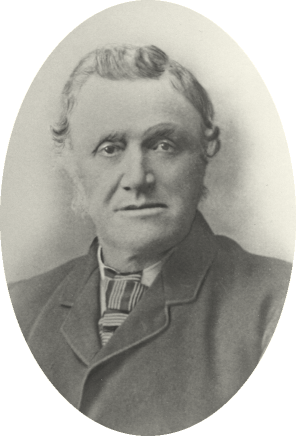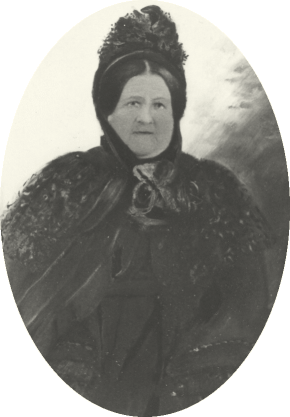|
James Lowe was born in Sheffield, Yorkshire, England in 1828. His parents were John and Ann Lowe nee Gibson. His father was a carpenter.
In 1850 he married Hannah Green in Sheffield.
In 1853 a daughter Annie was born, and John William in 1857.
On Wednesday 28th of October 1857 James, Hannah, four year old Annie and baby John William, set sail from London for Port Chalmers, Otago, New Zealand. The Lowes were not cabin passengers, but steerage passengers. The ship was the Palmyra and the trip took 110 days, arriving in Dunedin on Sunday 14th of February 1858. The Palmyra weighed 706 tons and the captain was Captain Tierney. There were nine deaths during the voyage.
The Early Settlers Museum in Dunedin has a number of letters written by passengers on the Palmyra recalling the trip out. This first recollection was written in 1928:
The good old ship Palmyra landed in Port Chalmers in the beginning of 1858 after a very long journey of 120 days. The death of Pilot Driver brought forcibly to my mind our entrance into Port Otago. The four stalwart Maoris who composed his crew greatly interested all on board - our arrival opposite Port Chalmers was marked by an incident which will still be remembered by the survivors for arriving at our anchorage one of our cables parted with the result that the stern of the
Palmyra swung round and smacked the Highland man who kept guard on the bow of the Strathallan. The panic that ensued was considerable. Some of the women folks fainting and wringing of hands till matters were righted. Then our troubles were only beginning as the old Hughon Bell landed us on a sandbank and kept us there till the tide floated us off again.
I often think what a large gathering could have been got together from the three ships - Robert Henderson, Strathallan and Palmyra while all landed in Port Chalmers within two weeks of one another - a good many of our fathers and mothers have passed away but I still come across many.
I have only penned these few remarks with the view of drawing out if possible more able accounts from some of the older people as I was only about eight years old then and have only what I remember. I am satisfied that we could get some very readable articles which would bring the old days to mind. I think the Palmyra carried about 300 passengers. My father James Hislop brought wife and nine boys and girls - that number could now be out numbered by a good many nines.
Yours Truly
A Hislop
Another account of the voyage was written in 1903:
Forty-five years today (14th February 1903) the American-built barque "Palmyra", 702 tons register, Captain Tierney (Dublin) arrived off Otago Heads, from London, with some 300 immigrants - English, Irish and Scotch. The Scotch were mostly from the Shires of Perth, Aberdeen and Inverness and the Kingdom o' Fife.
Being a youth of ten years of age then I cannot, altogether, give you accurate information relating to our voyage, which occupied 108 days from Gravesend to Taiaroa Heads.
We came through the Straits, and when passing the Bluff, we saw the barque William Hyde, stranded, lying inside the harbour. We came along the coast to close inshore, so much so, that we could see lights from some of the huts or whares in Port Molyneux - in fact, we were becalmed off there.
The voyage was rather an exciting one in some respects: any amount of fighting, which of course - to the youths on board - was looked on as fine fun. There was the brighter and livelier side of the picture by way of dancing in the fine evenings; and during the day, the Auld Scotty's (with due respect to them) amused themselves by playing the "Dam", or "Damned Board", to pass away the time. Broaching the cargo was another favourite pastime with a few of the passengers. I, innocently, assisted in holding a "naked" candle while the operation was going on. The chief mate (Stanbury), threatened to "blow" the ship up, for which he was court-marshalled, and was committed - not to a "dungeon-cell" - but into one of the cabin passenger's W.C's. "Crossing the line", varied matters for one day; when I, with a few more of the small-fry, looked
down from the lower fore-rigging (monkey-fashion), upon the scene of father "Neptune" coming onboard; when afterwards, he was mounted on the Port gun-carriage and wheeled in triumph around the ship. Afterwards, the "duck-pond", on the starboard side, was called into requisition, for the purpose of giving those who had gone through the process of being "shaved", with some blunt instrument, and for a "lather", tar and soap, a chance of "scraping" down; which also reminds me of a few of the passengers hovering around the mainmast during the "Duke of Argyle".
We were nearly wrecked when off the Canaries; the look out, apparently, having gone to sleep. However, a calamity was arrested by Robert Gartshore, now of Russell Street; he having gone on deck early in the morning to have a smoke, when he at once noticed our position, and reported accordingly.
The younger members of the ship were half-starved, at least I was, often going to the gallery for a "smell" of pea soup, boiled "salt-pork" and a few other highly-flavoured eatables, including of course, "plum duff" with treacle sauce - a sauce well known to those who arrived in the early days.
We had a narrow "save" at the "Heads", when well I remember the late "Dick" Driver springing onboard and rushing on to the "poop", which was the means, I suppose, from saving us from total destruction.
After arriving at Port Chalmers, my father's family, along with some thirty other passengers, were the last to leave the Palmyra for Dunedin, transhipping to the sloop "Bloomer", Captain Malcolm, with his mate "German Charlie". We left Carey's Bay about 2 o'clock in the afternoon and sailed up the "short" channel, sometime towed by the dingy, and arriving at the jetty, Jetty Street, at 10 o'clock in the evening. We (our family), we were at once escorted to, and accommodated at the
Commercial Hotel, High Street, which was then "run" by the late George Duncan, with the assistance of John Wain, who, I believe, was "head-man" and waiter...
I am etc
Andrew Walker Bremner
Upon arrival in Dunedin, the family lived in a small whare of manuka scrub with a tarred tarpauline for a roof. Bedsteads, tables and the rest of the furniture were made by using the chests marked "Wanted" and "Not Wanted on the Voyage". The food was simple, and eaten outside. They soon moved from their temporary hut into a hotel as boarders.
By 1864 the Lowes were living at Bay View Hotel in Maitland Street, Dunedin. On 7 January 1862 Hannah and James had a second daughter whom they called Emma. She was baptised at St Paul's Anglican Church in Dunedin on 23 April of that year. In 1864 a third daughter was born - called Eliza.
The family continued to live in Maitland Street until 1871 when they shifted to Dowling Street in the centre of town. In that same year, on 5 April 1871, Annie married Harry Goodman, a horse trainer of the suburb of Caversham.
In 1881 both Emma and Eliza were married - Emma to Thomas Allen and Eliza to William Joseph Smith. The only son, John William, married, but the marriage did not last. He shifted to Trentham where he worked as a horse trainer, leaving Mrs John W. Lowe living at their home in Leith Street, Dunedin. She quickly disappears from the scene.
In 1884 James and Hannah Lowe moved to Caversham where they lived in Nicholson Road - later Nicholson Street. James' health was not good. In shifting to Caversham they lived only a block away from their daughter Annie and the growing Goodman family which by now numbered seven children.
James Lowe's kidneys were failing, and he died on Thursday 17 July 1890 of Brights Disease, aged 62 years. Son-in-law Harry Goodman bought a grave plot in Dunedin's Southern Cemetery where James was buried. It was a simple burial with no religious service. His death was not announced in the paper, although a Memorial Notice appeared some years later:
LOWE. - In loving remembrance of our dear father, James Lowe, who died 11th July, 1890; aged 62 years.
We miss thee from our home, dear father;
We miss thee from thy place;
A shadow o'er our life is cast -
We miss the sunshine of thy face.
We miss thy kind and willing hand,
Thy fond and earnest care;
Our home is dark without thee -
We miss thee everywhere.
- Inserted by his loving daughters.
James' wife Hannah moved to Surrey Street in Caversham where she lived with her daughter Annie.
|
|

James Lowe


James' wife Hannah


James' daughter Annie


James' son John

|
 1828 - 1890
1828 - 1890 
 1828 - 1890
1828 - 1890 







